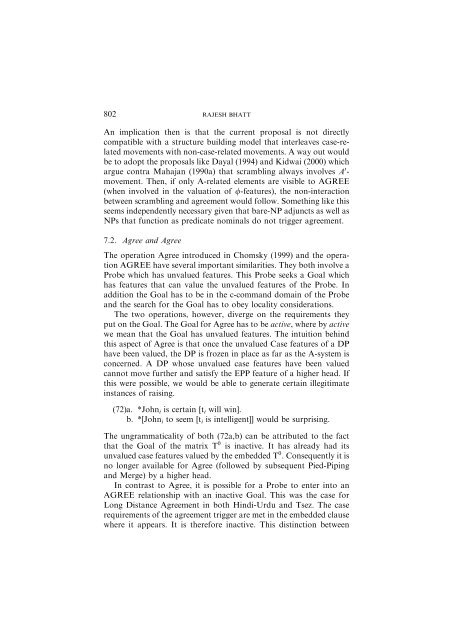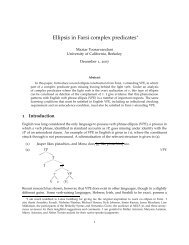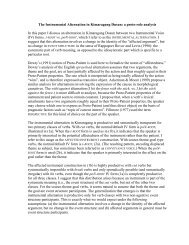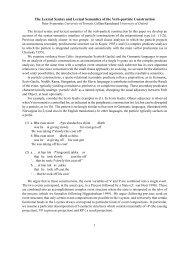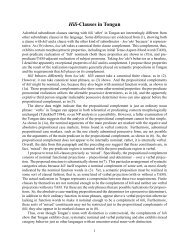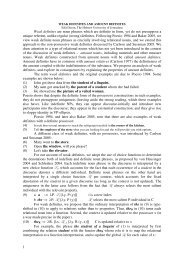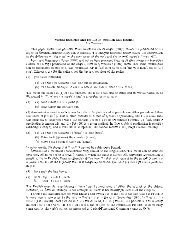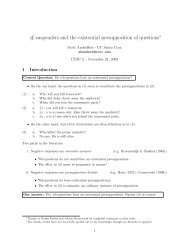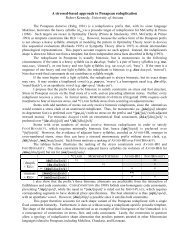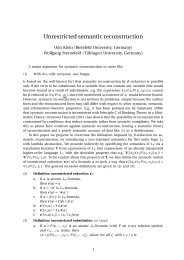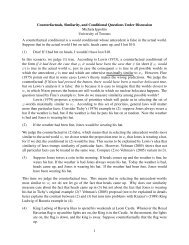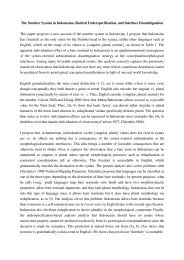LONG DISTANCE AGREEMENT IN HINDI-URDUw This paper ...
LONG DISTANCE AGREEMENT IN HINDI-URDUw This paper ...
LONG DISTANCE AGREEMENT IN HINDI-URDUw This paper ...
Create successful ePaper yourself
Turn your PDF publications into a flip-book with our unique Google optimized e-Paper software.
802RAJESH BHATTAn implication then is that the current proposal is not directlycompatible with a structure building model that interleaves case-relatedmovements with non-case-related movements. A way out wouldbe to adopt the proposals like Dayal (1994) and Kidwai (2000) whichargue contra Mahajan (1990a) that scrambling always involves A 0 -movement. Then, if only A-related elements are visible to AGREE(when involved in the valuation of /-features), the non-interactionbetween scrambling and agreement would follow. Something like thisseems independently necessary given that bare-NP adjuncts as well asNPs that function as predicate nominals do not trigger agreement.7.2. Agree and AgreeThe operation Agree introduced in Chomsky (1999) and the operationAGREE have several important similarities. They both involve aProbe which has unvalued features. <strong>This</strong> Probe seeks a Goal whichhas features that can value the unvalued features of the Probe. Inaddition the Goal has to be in the c-command domain of the Probeand the search for the Goal has to obey locality considerations.The two operations, however, diverge on the requirements theyput on the Goal. The Goal for Agree has to be active, where by activewe mean that the Goal has unvalued features. The intuition behindthis aspect of Agree is that once the unvalued Case features of a DPhave been valued, the DP is frozen in place as far as the A-system isconcerned. A DP whose unvalued case features have been valuedcannot move further and satisfy the EPP feature of a higher head. Ifthis were possible, we would be able to generate certain illegitimateinstances of raising.(72)a. *John i is certain [t i will win].b. *[John i to seem [t i is intelligent]] would be surprising.The ungrammaticality of both (72a,b) can be attributed to the factthat the Goal of the matrix T 0 is inactive. It has already had itsunvalued case features valued by the embedded T 0 . Consequently it isno longer available for Agree (followed by subsequent Pied-Pipingand Merge) by a higher head.In contrast to Agree, it is possible for a Probe to enter into anAGREE relationship with an inactive Goal. <strong>This</strong> was the case forLong Distance Agreement in both Hindi-Urdu and Tsez. The caserequirements of the agreement trigger are met in the embedded clausewhere it appears. It is therefore inactive. <strong>This</strong> distinction between


